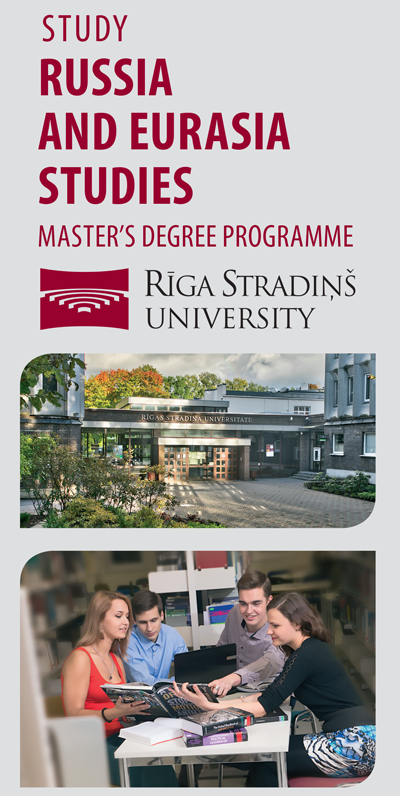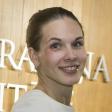Russia and Eurasia Studies
A unique study programme in English that allows you to obtain a Master's Degree in Political Science, focusing on Russia and Russia-related issues in Eurasia.
Programme Fact File
Sociology, Political Science, Anthropology
accredited until
Master's Degree of Social Sciences in Political Science
10 government subsidised
6 full fee
Russia’s increasing isolation is causing significant political and economic shifts in its vicinity. These dynamics are impacting other regions and global processes.
Russia's war against Ukraine has fundamentally impacted European security and will continue to cast a shadow over it in the foreseeable future as well. Other regional developments analysed in the study programme will continue to remain relevant in both the regional and global context. Those include:
- the so-called "frozen conflicts" in Moldova, Georgia, as well as the partially active conflict between Azerbaijan and Armenia;
- undemocratic governance and related potential political and economic transformation processes in a number of countries of Eastern Europe, Southern Caucasus and Central Asia;
- the influence of Taliban-ruled Afghanistan on Central Asian countries, in particular Tajikistan, Turkmenistan and Uzbekistan;
- the increasing economic and political clout of the People's Republic of China in Central Asia and other regions via Belt and Road Initiative and its projects.
There is therefore a growing demand for specialists in international relations and diplomacy with advanced knowledge of Russia, Eastern Europe, Southern Caucasus, and Central Asia. Russia's increasing isolation from the West, as well as its pivot towards itself coupled with the domestic policy developments all underscore this demand.
Why study Russia and Eurasia in Latvia?
- Studying at one of the top locations on Russia expertise in the European Union (EU) provides a combination of experience-based topical knowledge with the quality of a European education;
- Latvia has accumulated a vast experience in political, economic and social transformation by vigorously departing from Russia’s orbit and joining Western institutional pillars – the EU, North Atlantic Treaty Organization (NATO) and the Organisation for Economic Co-operation and Development (OECD). Thereby Latvia and the other two Baltic states serve as role models to Eastern European and other countries in transition;
- Putting Russian domestic and foreign policy at the core, the program offers focused, detailed and applied study courses, while also providing first-hand knowledge on wider Eurasian issues covering Eastern Europe, the Caucasus and Central Asia;
- Central Asia and EU Eastern Partnership countries have historically all been at the heart of Latvia’s foreign policy. This provides students with the opportunity to witness national and EU policy taking shape first-hand and the ability to participate in regular public discussions and other events;
- The programme's instructors have unique expertise in the international academic environment, think-tanks and extensive field experience as practitioners (e.g. as EU and national level diplomats) with regionalist research interests ranging from Russia to China, as well as a proficiency in major Eurasian languages and cultures.
Study environment, content, and methods
Study structure and methods
The programme features three main thematic blocks, which offer both compulsory and elective courses.
The first study block covers Russia's domestic and foreign policy. It includes the following courses:
- Russian History from the Middle Ages to the 20th Century;
- Russian Political Culture in Transformation;
- Russian Domestic Politics – Factors and Actors;
- Russian Politics and Religions;
- Russian Economics – Resources vs. Modernisation;
- The Political Economy of Russian Transformation;
- Russian Foreign Policy and Unconventional Approaches;
- Russian Defence Policy;
- Russia and International Organisations;
- Russia, the U.S., and the Baltics – Interaction in the Past and Present;
- Russia-China Partnership – Factors and Interests;
- Russo-centric Institutional Governance Architecture – EEU, CSTO, CIS and Beyond;
- Russian Communities in Europe.
The second study block is devoted to the sub-regions of Eastern Europe, South Caucasus and Central Asia, as well as the interaction between them. It includes the following courses:
- Russia, Eastern Europe, Caucasus, Central Asia and the Baltics – Domestic and Foreign Politics Between Past and Present;
- Transitional Justice – Post-Post-Soviet Space and Beyond;
- Gender and Sexuality in the Post-Post-Soviet Space;
- Central Asia – Domestic Dynamics and Neighbourhood Conundrum;
- Eastern European and South Caucasus - Countries Between the EU’s Eastern Partnership and Other (geo)Political Projects;
- Ukraine – the State “in Between”;
- Belarus between the East and the West;
- Biopolitics and Biopower – Interdisciplinary Encounters in Eastern Europe and Eurasia at Large;
- Frozen conflicts in the Post-Post-Soviet Space – Developments, Challenges and Perspectives.
The theories, methods and methodology of international relations and diplomacy will be presented via such study courses as
- Theories and Methods in International Relations and Diplomacy,
- Scientific Writing,
- Academic Workshop.
Further information about the contents of each study course is available in the syllabuses below. The courses are taught by opinion leaders and practitioners of Latvian international relations, as well as by international instructors (please see below for details).
Students are eligible for the Erasmus+ exchange programme from their third semester, including to the programme's partner organisation, the Kyrgyz National University in Bishkek.
Further information about Erasmus+ regulations and partner universities
This programme is implemented in cooperation with other partner organisations in Central Asia, including the Central Asia Institute for Strategic Studies (CAISS) and the Kazakh Ablai Khan University of International Relations and World Languages.
- Study courses
3. semester Category Course code Course title Structural unit Course supervisor ECTS B PZK_172 Biopolitics and Biopower - Interdisciplinary Encounters in Eastern Europe and Eurasia at Large Faculty of Social Sciences Andrey Makarychev 4.5 A PZK_184 Central Asia - Domestic Dynamics and Neighbourhood Conundrum Faculty of Social Sciences Māris Andžāns 7.5 B PZK_173 Frozen conflicts in the Post-Post-Soviet Space - Developments, Challenges and Perspectives Faculty of Social Sciences Mārtiņš Vargulis 3 B PZK_177 Russia's Economics - Resources vs. Modernisation Faculty of Social Sciences Kārlis Bukovskis 7.5 B PZK_164 Russia's Political Economy Transformation Faculty of Social Sciences Māris Andžāns 4.5 A PZK_152 Theories and Methods in International Relations and Diplomacy Faculty of Social Sciences Kārlis Bukovskis 7.5 4. semester Category Course code Course title Structural unit Course supervisor ECTS A PZK_032 Development of Master’s Thesis and Defence Faculty of Social Sciences Māris Andžāns 30
Expected results
- The ability to model future scenarios and develop empirical phenomena by conducting individual research and scientific work based on in-depth knowledge of the theoretical and methodological aspects of international relations and an understanding of empirical phenomena in the broader context of regularities and theoretical assumptions;
- The ability to navigate the most important international relations issues within the current historical context.
- The ability to interpret and predict Russia's internal processes and foreign policy behaviour, as well as Russia's interactions with other centres of power through both bilateral and multilateral cooperation.
- An understanding of the domestic and foreign policy dynamics of Eastern Europe, the Southern Caucasus and Central Asia, including their interaction with Russia and other regional and global centres of power.
- The ability to perform large-scale analytical work independently by selecting and evaluating information critically in order to come to an objective and neutral solution.
- The ability to work in a professional team and cooperate with partners - lead group work, convince others, coordinate duties, motivate others.
- The ability to conduct large-scale individual work and make qualitative decisions in stressful conditions, when a number of tasks of different importance and complexity have to be performed at the same time. Acquired skills include planning, prioritisation and resilience to stress.
- Proficiency in languages that will aid in analysing issues from Russia, East Europe, Caucasus and Central Asia.
- Competency to integrate methods and knowledge from different sectors to develop new solutions, like information technology solutions, in order to acquire new knowledge and solutions in other sectors.
- Competency to develop innovative solutions for professional work in the academic environment, public administration, as well as in the non-governmental sector and business environment.
Academic methods
Studies are organised in the form of lectures and workshops with an emphasis on independent work. Extracurricular trips to the focus regions of in the study programme are also planned.
Location
Career opportunities after graduation
The Russia and Eurasia Studies programme will help graduates develop a career in the national diplomatic corps, at international organisations, commercial companies, universities and think-tanks with a focus on Russia and/or different Eurasian issues. The programme also prepares students for further PhD studies.
Admission requirements
Summary of the main requirements:
- Bachelor’s degree in social sciences and/or humanities (in case the applicant has a bachelor’s degree in another field, there will be an interview with the Head of the programme);
- Certificate of English proficiency;
- Description of a prospective master’s thesis (essay);
- Letter of motivation.
What to study next?
Graduates from the programme can choose to continue studying at RSU in one of the following doctoral study programmes:
![LV_ID_EU_logo_ansamblis_ESF_eng[1].jpg](/sites/default/files/imce/logos/LV_ID_EU_logo_ansamblis_ESF_eng%5B1%5D.jpg)
Project nr. 8.2.1.0/18/A/014 Reducing study programme fragmentation and promoting study internationalisation at Rīga Stradiņš University
Head of Programme
Acting Researcher, Faculty of Social Sciences
Academic Staff, Faculty of Social Sciences
Working hours:
By appointment (e-mail).Contact Information
Faculty of Social Sciences
Fri, 8:30 -15:30











